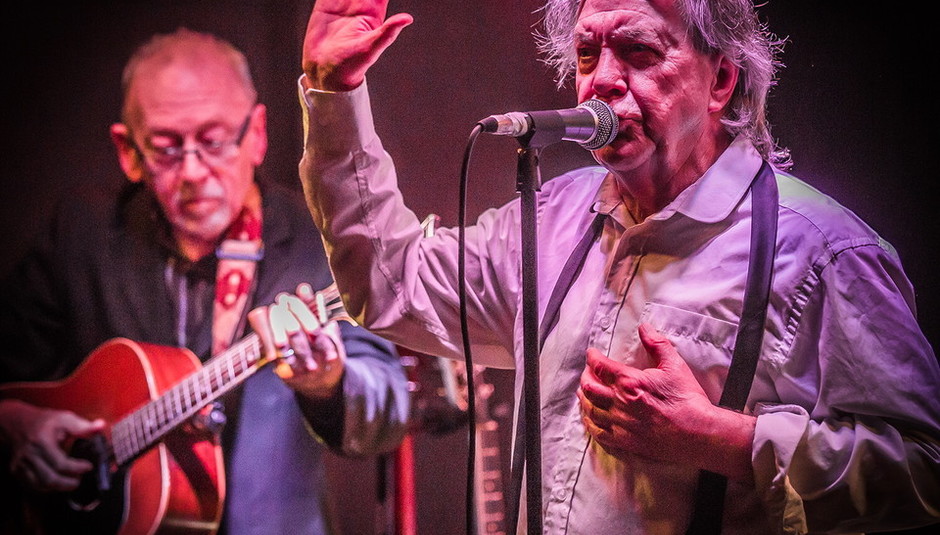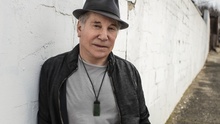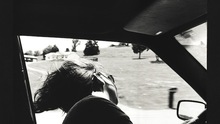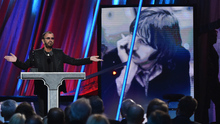As one of the most groundbreaking British bands from the 1960s, The Pretty Things legacy is firmly intact. Formed in 1963, they're still going strong as tonight's incredible sold out show at Derby's intimate Flowerpot venue demonstrates. Not only are they still a live force to be reckoned with, they've also lost none of their creative spark either. Last year saw them release their twelfth studio album, The Sweet Pretty Things (Are In Bed Now, Of Course...), to a wave of critical acclaim. Remaining faithful to the vibe and tenacity of their earlier works yet also clearly the work of a band in constant transition, it's another welcome addition to an already impressive and highly revered back catalogue.
Nowadays, just two of the original members - singer Phil May and guitarist Dick Taylor - remain. Alongside the other three members - fellow guitar player Frank Holland, bassist George Woosey and Jack Greenwood on drums, they're a formidable force and quite frankly one of the most captivating live bands I've witnessed in a long while.
Prior to this evening's show, I caught up with frontman May and former Rolling Stone Taylor before soundcheck. Here's how the conversation went.
DiS: This is your 53rd year as a band and you're still touring, which is quite a remarkable achievement.
Phil May: It's fantastic!
Dick Taylor: It's actually quite gratifying that people are still coming to see us, and generally also quite fun.
Phil May: We were in Paris the other day where we hadn't played for a year or two and the reception was just crazy. Same when we played in Spain and Italy recently.
Dick Taylor: We played in loads of places last year. Germany, the Netherlands, lots of different festivals. It was great. It really brings things home to you. A friend of ours sent us a poster the other day from the first time we played in Paris. It was 1965 and we were on the bill with Jimmy Cliff, The Walker Brothers, The Spencer Davis Group and funnily enough, a woman called Adele. And as I pointed out, she's really aged well hasn't she! We also met the guy who played Oddjob in the James Bond film 'Goldfinger'.
Phil May: I remember us walking in while The Spencer Davis Group were soundchecking and they played 'Gimme Some Lovin'' which I'd not heard before. And I didn't know if it was something they'd written themselves so I remember asking Spencer (Davis) if it was going spare as it's a great song and he said it was their single. So I just said, "Forget it!"
DiS: What would you say is the secret to your longevity?
Phil May: Perseverance. Stubbornness.
Dick Taylor: Stupidity!
Phil May: I don't know really. I remember Dick (Taylor) once saying we kind of fell into it. You get up one morning and Mark (St John) our manager says let's go to the Russian embassy and get some visas. We're playing in Moscow. Or he'll say say I've got some studio time, how about another album? So it becomes something you do.
Dick Taylor: If you think about it, it's possibly the best job in the world.
Phil May: There is a toll on it. It does become exhausting. For me now I struggle with the travelling. The other half is OK. But the eight and nine hours getting to places and then getting back to the hotel at one or two in the morning. Soundchecks or as is the case this evening, waiting for the soundman to turn up.
Dick Taylor: That could be the title of our next album. 'Waiting For The Soundman!'
DiS: You released your twelfth studio album last year, The Sweet Pretty Things (Are In Bed Now, Of Course...). What inspires you to carry on writing and recording new music? Is there going to be another record?
Phil May: Yeah, I think there'll be another album soon. I wasn't joking when I said Mark (St John) had some studio time and asked us to make another album. We've got a bunch of songs ready so there's a good chance we'll start recording in two or three weeks time, God willing.
Dick Taylor: That's pretty much what happened with the last album as well. The guy from Repertoire Records asked us if we'd like to make an album with him...
Phil May: Thomas Neelsen...
Dick Taylor: That's him. So we went into the place where we rehearse for a couple of days and found that we had enough new bits and pieces for an album. So by the time we got to the studio a week or two later we knew those songs were good enough and we also wrote a few more while we were there as well. So it all worked out.
Phil May: It could have been a case of "Maybe we shouldn't have made this album?" but thankfully it wasn't. The reviews were fantastic and people saying it didn't sound like an old band's album was the biggest compliment we could have received.
Dick Taylor: It's very difficult to critically assess your own music. I listen to our recordings and think they're great but then I guess there'd be something wrong if I didn't. It's impossible to look at your own work objectively. Absolutely impossible.
DiS: What influenced the songs on The Sweet Pretty Things...?
Phil May: Life I guess. My words tend to be about personal experience.
Dick Taylor: What, you mean like 'Dirty Song'?!
Phil May: Ha Ha, yeah I guess! My biggest fear is I don't want to make anything that's less than the benchmark we laid down. There's some incredible albums in our back catalogue and it would be terrible to release something that didn't match those. You don't really know how things will pan out until we start recording stuff. It's like going through a door. And somebody's paid £10k for that door. And we can't give it back to them by saying sorry, we can't to get back out of that door. One of the reasons we did the last album was because we've got a young bass player and drummer, who although they've been with us for five years have never actually made a studio album. And this line-up is such a good version of The Pretty Things that it only seemed right for us to make a record. They've been playing the songs Dick and I played on years ago, so it's nice for them to have something they played on themselves. Although we shouldn't forget the live album we did at the 100 Club in 2014 where we played the first album in its entirety.
DiS: The Pretty Things led the way in a lot of genres, particularly in the 1960s. You were playing R&B before that went mainstream, psychedelic rock before that got popular, introduced soul into rock music and also got cited as a massive influence by artists such as David Bowie and the Sex Pistols. How does it feel being seen as pioneers by so many?
Phil May: I don't know. How do you feel about it Dick?
Dick Taylor: It's nice but also a bit strange at times.
Phil May: Like when Aerosmith played at Wembley a few years ago. A friend of ours was their guitar tech and he said Steve (Tyler) really wants to meet you. So I went into this VIP room with all these stars and as I got to the door, Steve saw me, came over and got down on his knees. All these people were sat in the room going who the fuck's that! He always said that hearing 'Mona' by The Pretty Things made him become a rock singer.
Dick Taylor: Then there's Serge (Pizzorno) who said there wouldn't have been a Kasabian without S.F. Sorrow. And there's poor old David (Bowie) too. He used to follow us around.
DiS: Did you ever think at the time he'd go on to become this internationally acclaimed cultural icon?
Dick Taylor: No, I don't think we'd have said that.
Phil May: But he was certainly different.
Dick Taylor: Of all the people that used to wait around the side of the stage when we came off he always had the most presence. He was like a white duke then.
Phil May: He was almost translucent. And I didn't know if he was gay or straight even then. He was quite fey, very stylish. He stood out from everybody else. He was almost like a stalker!
Dick Taylor: After his R&B phase we saw him play at the Roundhouse and it was like nothing else on earth. He was always ahead of the game. A very interesting character.
Phil May: I guess the nearest anyone's come to him in recent years is possibly Jack White in the way he soaks up all these ideas and influences. Then he changes his wardrobe and musical style into something completely different. Almost transforming into this new person altogether.
Dick Taylor: Absorbing. Even listening to his back catalogue now it still sounds incredibly timeless.
DiS: What do you think to his covers of 'Don't Bring Me Down' and 'Rosalyn' that appeared on his Pin Ups album?
Dick Taylor: When I first heard them I thought that's not us!
Phil May: But then at the same time they're actually quite faithful to the originals. There's a little scream in the middle of 'Don't Bring Me Down' which he does in exactly the same spot as I do.
DiS: You were also one of the first UK bands to be embraced by the American garage rock scene of the 1960s. Were you big fans of those bands? People like The Standells and The Chocolate Watch Band?
Dick Taylor: We'd never heard of any of them at the time. I remember when The Kingsmen came out with 'Louie Louie'. That was so good. But other than that, we never got to hear any of the other American bands who were making a similar kind of music. What amazes me today is when you go to certain clubs - particularly in Germany - the DJs play these amazing records from the sixties and I always think to myself why didn't we hear it at the time? Back in the day, we'd go to places like the Speakeasy and the DJs would play some really good stuff but when I hear people still digging out these obscure records from that era it makes me wonder why they never got discovered back then.
Phil May: When we play some of the bespoke 1960s themed gigs the DJs play some incredible music. We did a whole Electric Banana set at one of those once. Which we should have recorded because the people who own those recordings won't let us release them.
DiS: You made several records under the Electric Banana alias. What was the reason behind that?
Phil May: Basically because we were skint! They approached us.
Dick Taylor: De Wolfe Music approached us and asked if we'd be interested in making an album of music for their library. Basically they licence music for films and television shows, so we had to do it under a different guise. Once we started doing it we made quite a few albums for De Wolfe.
Phil May: And we did need the money because according to our manager at the time, the advance we received for S.F. Sorrow was taken up in debt. We never saw a penny of that, so we were working on these Electric Banana pieces to pay for S.F. Sorrow. So we'd go away and do four days work for De Wolfe in Germany, then come back and spend four days on S.F. Sorrow. And this went on for the best part of a year.
Dick Taylor: The two things almost kind of merged. We actually got this gig playing as Electric Banana in the Norman Wisdom film 'What's Good For The Goose', and that was in between the two contracts we had with Fontana and EMI. Which meant we were kind of at liberty to do stuff. When 'What's Good For The Goose' came along it helped us into S.F. Sorrow.
Phil May: I remember us writing some of that record while we were waiting to go on the set.
DiS: S.F. Sorrow is cited now as the first real concept album. How did the ideas for the record materialize?
Phil May: We didn't want to make another five a sides, five b sides record. We'd already done it. S.F. Sorrow was inspired by classical music and opera. It was created as a musical journey, a literal journey from start to finish.
Dick Taylor: We wanted to make an album that had a central theme rather than just being a collection of random songs.
Phil May: We were looking for another way to progress because if we hadn't have come up with S.F. Sorrow we'd have broken up. We'd done the circuit and we needed somewhere else to go. We needed to be in command of our own destiny in terms of material. If we hadn't found our writing vein - Johnny Dee wrote us a couple of hits and Dick and I wrote 'Midnight To Six Man' - I think we'd have called it a day. It was a bit like being on a treadmill. It wasn't going anywhere.
DiS: What's really ironic is that influential records from that era like S.F. Sorrow and the first Velvet Underground, MC5 and Stooges records got panned by the critics at the time and had little commercial impact.
Phil May: Forever Changes by Love as well. Apparently that didn't sell many copies back then either.
Dick Taylor: I think we were seen as more of a musicians band. We were certainly a big part of that London underground scene during the mid to late 1960s. We were in this little world and we thought it extended the length and breadth of the country when clearly it didn't.
Phil May: I remember when we played in Rome, and the whole room just fell silent. You could hear a pin drop and people's jaws were dropping. It was unbelievable. I wondered what they were looking at because we thought we were normal!
Dick Taylor: But that went on way after us. I remember when Tom Petty first came over supporting Nils Lofgren. I went to one of the shows and the whole audience were really into him but at that time, he was unheard of in America. He totally broke England before anything happened in the States. There was a radio programme about it quite recently.
DiS: With such an extensive back catalogue to choose from, how do you decide on putting a setlist together for a live show?
Dick Taylor: We tend to set it towards a particular theme depending on where we're playing and who we're playing to. There are certain songs we know we have to play.
Phil May: We always play a few songs from S.F. Sorrow.
DiS: Do you play the same songs off that record every time?
Phil May: No there's four or five things which we change around. Same as Dick said. There are just certain things that we have to play. 'Don't Bring Me Down', 'Rosalyn', 'Defecting Grey', 'Midnight To Six Man'.
Dick Taylor: There's always someone who'll come up to us afterwards and go, "Why didn't you do 'Get A Buzz'?" or whatever's not in the set that evening.
Phil May: We do play that sometimes but then a lot of the time we don't. There's a couple off the new album that we play regularly. It can sometimes be hard to fit in actually, because it does have to run as a set. Some songs just don't work in between two other songs so it's important to get a rhythm going.
DiS: Your court case from the early 1990s against EMI over unpaid royalties is well documented, but do you think your pursuit and eventual victory set a precedent for other artists in the future to take on record companies if treated unfairly?
Phil May: It was a long process. We really thought about whether we should push it right until the end because if we'd taken the money and our rights back we couldn't publish anything in case we attempted to blow the lid off it.
Dick Taylor: We're not allowed to talk about the exact settlement even now.
Phil May: The more we thought about the way EMI behaved in all of this - not letting us have our demos, keeping the copyrights to our work - the more we realised this is just common fraud and it was going on all over the place. So maybe we set a precedent in the fact we won the case, but we couldn't go as far as we wanted to because it all became sub-judicious which meant we couldn't talk about it. I think it made record companies realise that if the artist has an imbalanced contract it's not worth the paper it's written on.
DiS: With the internet making music more accessible and eliminating the need for record labels to release your songs, do you think a band like The Pretty Things would have been more successful in this day and age?
Phil May: Because we were a niche band making music that wasn't mainstream, we were fortunate to have a strong group of people supporting us. Whereas if we'd just been general flavours of the month, I know whether we'd have amassed such a hardcore fanbase. I think it's really difficult to be a Pretty Things fan.
Dick Taylor: Right now, if we were who we were then, we wouldn't be doing any groundbreaking so there you have it really.
Phil May: You can't really change time.
Dick Taylor: You can't. And it's such a different time now. In some ways it's amazing that so many different types of music are accessible and there are people who are interested in it. On the other hand, we were lucky because everything was kind of homogenous back then. So it meant bands like us and The Yardbirds, The Kinks, The Animals and so on. We could all be on the same level. Now it's all fragmented.
Phil May: We were all kicking each other up the arse and driving the music on.
DiS: Was there ever a point where you felt other bands achieved the commercial success that should have gone your way instead?
Dick Taylor: No, not really.
Phil May: If you have those thoughts you end up with a lot of excess baggage.
DiS: If you had the benefit of hindsight is there anything you'd do differently?
Phil May: I'd become a lawyer! But seriously, I don't think there's anything I'd change other than more people to have heard our music. At the same time, I don't know what I could have done to change that. Maybe we could have made more acceptable music? Mark our manager says if ever you try and dance to a Pretty Things song you'd end up breaking your leg! It keeps changing tempo so I guess we could have been less complicated.
Dick Taylor: I don't think I would ever have joined The Rolling Stones because then no one would ask me any questions about why I left!
DiS: What advice have you got for new bands just starting out?
Dick Taylor: Persist. Do what you believe in and not what you think people want.
For more information on The Pretty Things visit their official website.
Photo by Shaun Gordon
























